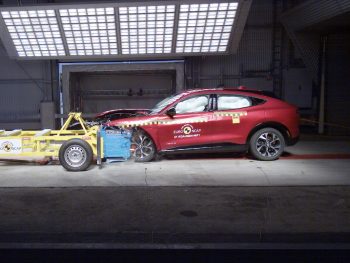Mainstream carmakers ace electric vehicle safety tests
The Ford Mustang Mach-E and Hyundai Ioniq 5 electric vehicles have both scored five stars under the latest Euro NCAP safety ratings.

The Ford Mustang Mach-E performed well in all areas of testing, providing a great example of the ongoing investment in safety made by carmakers, according to Thatcham
The cars were part of a batch of five vehicles that also included Hyundai’s Tucson and the hybrid Toyota Yaris Cross, both of which also took the top five-star rating. Meanwhile, the Hyundai Bayon petrol compact crossover was awarded four stars.
The results showed that the Ford Mustang Mach-E performed well in all areas of testing, providing a great example of the ongoing investment in safety made by carmakers, according to Euro NCAP member Thatcham.
The Mach-E is also one of the first few cars to have Autonomous Emergency Braking (AEB) not only in the front of the vehicle to protect against forward collisions, but also at the rear of the vehicle.
Matthew Avery, chief strategic research officer, Thatcham Research, said: “It is positive to see a mainstream brand like Ford contributing to the EV safety narrative, proving that EVs are just as safe as ICE vehicles and a good choice of family car. In fact, a large proportion of the new vehicles tested this year have been dedicated EVs and the majority have achieved five stars, which is to the credit of all EV carmakers.”
The Hyundai Ioniq 5 also provided a further example of a high-performing all-electric vehicle. Based on the Hyundai Motor Group’s EV-dedicated Electric-Global Modular Platform, the Ioniq 5 performed well in all areas of testing, with strong Adult and Child Occupant Protection scores of 88% and 86% respectively. It also includes important features such as a centre airbag for occupant-to-occupant protection in lateral impacts. And the Ioniq 5’s Safety Assist features scored highly with good AEB and driver monitoring systems.
The Hyundai Tucson SUV also received five stars in Euro NCAP assessment, providing good protection to all sizes of dummy, while the Hyundai Bayon, which is based on the i20, achieved four stars.
Avery added: “The Hyundai Bayon performed solidly in testing; however, it is disappointing to see the car dropping points in some areas; the lack of a lateral impact airbag specifically, as Hyundai were one of the first manufacturers to fit this important passive safety feature to its vehicles and it is present in both the Hyundai Ioniq 5 and Tucson.”
Finally, the Toyota Yaris Cross hybrid was another five-star scorer. Avery said: “This vehicle is a good option for those that don’t want to commit to something fully electric, but still want a very safe vehicle from a known manufacturer.
“The Yaris is also aimed at the more affordable end of the market yet does not sacrifice any Euro NCAP stars or compromise on safety in any way, despite being less expensive than other hybrid or fully electric vehicles.”
Euro NCAP also evaluated the electric Volvo XC40 Recharge and plug-in hybrid VW Touareg PHEV. Both cars share their respective five-star ratings with their conventionally engined siblings tested in 2018.
In addition, Euro NCAP retested two light commercial vans: the Ford Transit and the Ford Transit Custom, after Ford made seatbelt reminders as standard for all occupants across the European market. As a result, the two were dubbed Gold Winners in Euro NCAP’s Commercial Van ranking.
Michiel van Ratingen, secretary general at Euro NCAP, said: “Vehicle use in road traffic is the most significant contributor to work-related traumatic injury, so small improvements, especially those that promote seatbelt wearing, can go a long way. Congratulations to Ford for updating their two commercial vans and making the effort of putting seatbelt reminders as standard for drivers and co-drivers.”












